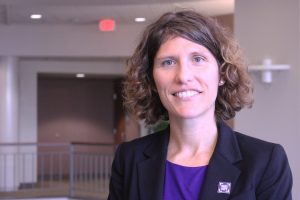
Kirsten Bryant, PhD, launched a mission to find more treatment options for pancreatic cancer patients after losing her father, Bernard Elzer Jr., to the disease in 2013.
“As I watched what my dad went through, and saw how few treatment options there were for him, I came around to the decision that this was something I wanted to try to work on to improve the situation for other people,” said Bryant, who is an assistant professor at the University of North Carolina Lineberger Comprehensive Cancer Center. She works in the lab of Channing Der, PhD, the Sarah Graham Kenan Professor of Pharmacology at the UNC School of Medicine and a UNC Lineberger member. Der is focused on pancreatic cancer treatment research in his laboratory.
Bryant was the only girl among four children and had a special bond with her father growing up. As a little girl, she would follow him around with her Fisher-Price wheelbarrow while he planted flowers and did other yardwork. Her family has photographs of her asleep in a flower bed.
“He was always outside, and I was always helping him, or pretending to,” she said.
Bryant said her father was a successful businessman who tried to do everything to the best of his ability, and he passed along that work ethic and drive to her. He was excited she was going to earn her doctorate, and it was while she was finishing her graduate degree at Cornell University in April, 2012, that he was diagnosed with pancreatic cancer. At the time, she was studying basic science and cancer signaling.
Before her father’s diagnosis, he was active and physically fit. But then he started experiencing back pain. One medical test led to another, and eventually, doctors found a six-centimeter lump on his pancreas and additional metastases in his liver. Bryant said after his cancer did not respond to standard-of-care treatments, her father enrolled in a clinical trial. The experimental treatment didn’t work either, but he wasn’t ready to give up. It was the lack of additional options for her father that spurred Bryant to work in pancreatic cancer research.
“To the day he died, he was convinced a new treatment was going to become available, and he was going to get better, but there was just nothing for him, and that was so hard to watch,” she said.
Bryant is first author of a paper published in Nature Medicine that reports promising results from early laboratory studies of a treatment strategy for pancreatic cancer. The idea is to force the cancer to rely on autophagy, a type of energy production in which cells recycle their own parts. The preclinical study demonstrated the benefit of combining a treatment that forces cancer cells to rely more heavily on autophagy with another compound that indirectly blocks that same energy pathway.
While Bryant doesn’t think this will be the “magic bullet,” she is cautiously optimistic for the results of clinical trials that have been initiated based on the results of her study. Currently, the only curative treatment for pancreatic cancer is surgery.
“If we can use this chemotherapeutic to shrink tumors to the point where they could be removed, that could be really exciting someday,” Bryant said. “We’re just going to have to see how the trials in patients look.”
